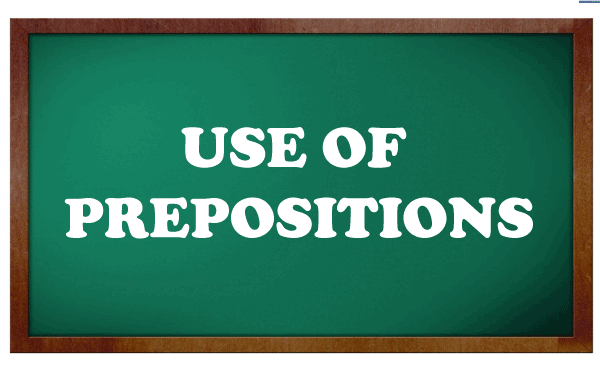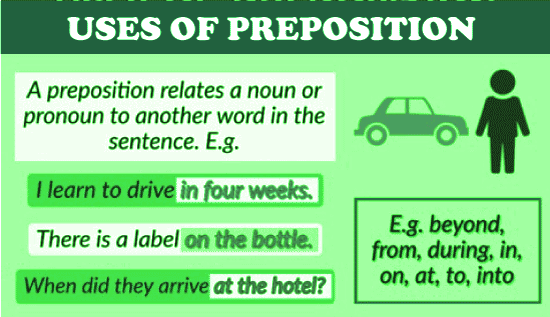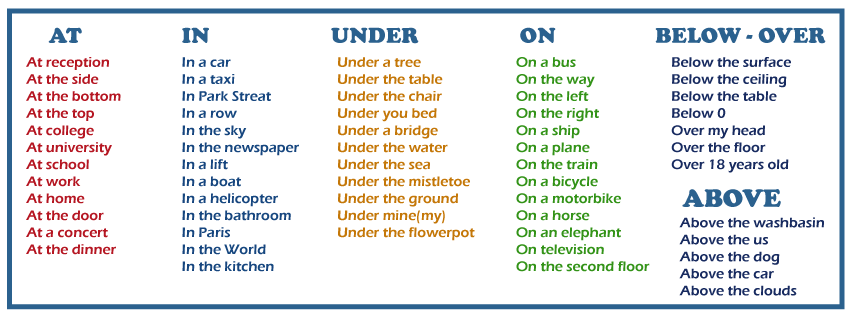Uses Of PrepositionWhat is a preposition?A preposition is a term that connects noun, pronoun, or phrase in a sentence to other terms in the sentence. Prepositions have the following characteristics
However, understanding prepositions is a bit tough therefore, students should be aware when reading a book or other papers and check the usage of the preposition for better understanding. 
Use of Preposition on the basis of Its Types1. Preposition of DirectionThe objective of these kinds of prepositions is to demonstrate how something is done and to express how something should be done. Here is a complete list of prepositions that indicate a direction, along with their meanings and usage.
Some of the examples with the use of preposition of direction are;

2. Preposition of TimeThese words are used to indicate to a specific point in time. Here is a complete list of prepositions that indicate time, along with their meanings and usage.
Some of the examples with the use of preposition of time are;
3. Preposition of Place/locationThe concept of a place preposition means a term that indicates the position of an object in a sentence. Here is a complete list of prepositions that indicate place, along with their meanings and usage.
Some of the examples with the use of preposition of place/ location are;
Other English Grammar Prepositions: There are certain prepositions in English grammar that do not meet the prerequisites of time, place, and direction. All of these types of preposition terms in grammar are covered in the preposition list with meaning below.
Uses of Prepositions in English in Various ContextsOften in English grammar, prepositions are used in a variety of ways, and the meaning varies greatly depending on context. They are available in the section below. The prepositional phrase served as ConjunctionsSome words are prepositions, yet they serve as conjunctions. Rules for Prepositions-The preposition placed before a phrase functions as conjunction. However, when a word is placed before a noun phrase, it remains a preposition. The most typical terms used in these types of preposition include after, as, since, before, until, and so on.
The preposition that acts as AdverbsWords that you might conceive of as prepositions can sometimes serve as adverbs. When a word modifies a verb, it begins to behave as an adverb. This rule is followed by the following prepositions in English: about, across, around, before, beyond, in, inside, near, opposite, outside, past, round, through, under, up, within.
Use of Preposition with AdjectivePreposition words are often used after adjectives to finish or expound on the concept or emotion that the adjectives represent. There are no explicit preposition rules for combining adjectives with English grammar prepositions. Below are some sentences with adjectives and prepositions:
Use of Preposition with NounsCertain preposition words can be combined with nouns to link or clarify ideas conveyed in sentences. The preposition is always placed after the noun in this kind of pairing. Here are some instances of noun and preposition:
Use of a Preposition Using VerbsCertain verbs require prepositions to link with their objects. Verbs are generally followed by prepositions before the verb's object. These types of prepositions are referred to as dependent prepositions. Here is a list of preposition examples with verbs:
Some common prepositions and usesHere are a few common prepositions that we use in our daily routine. Read on to understand the use of preposition; On : On (implies to some- thing's surface )- She kept the glasses on the table. On (refers to specific days as well as dates)- They will reach on Monday. Ram was born on 15th January. On (Implies to devices)- He is always on the phone. This series will be on TV now. On (implies to the body parts) - I have to wear this ring on my finger for some time. On (for referring a state)- The chocolates in the govt shop are on sale. 
At : At (implies to a place)- There are so many senior citizens at the park. At (implies to email address)- Please send the details @ (at) [email protected] At (to allude to a particular time) - We all are meeting at 3 pm today. At (to refer to someone's activity)-Julie laughed at my singing in the performance. In : In (to refer to a place/location)- We are in my cousin's place now. In (utilized while some activity) - The slogan should be catchy in advertising of the products. In (To refer to the opinions, beliefs, feelings, etc.)- They believe in working hard. In (to refer to certain days, months, seasons or year) - I prefer to study English in the afternoon. The new class will begin in January. In (to refer to colors, shapes, and sizes) - This outfit comes in three sizes. To : To (to refer to the directions, places)- The group went to the hotel for celebration. I am moving to my office. To (to refer to relationships) - Don't ever talk to annoying people. Your response is important to us. To (to refer to limit) - The papers were piled up to the ceiling. To (to indicate the period) - I am available for a call from 11 to 12. Of : Of (to refer to relate to, belong to) - We have dreamed of being popular. Of (to point out to reference) - This is a photo of my previous celebration. Of (to refer to the numbers or amount) - A large volume of individuals can speak English. For : For (to refer to the reason) - We are happy for you. For (to refer to the duration or time) - I went to the class for one month only. For (clarifying the usage of something) - He is preparing for his exams.
Next TopicAdjective Examples
|
 For Videos Join Our Youtube Channel: Join Now
For Videos Join Our Youtube Channel: Join Now
Feedback
- Send your Feedback to [email protected]
Help Others, Please Share










